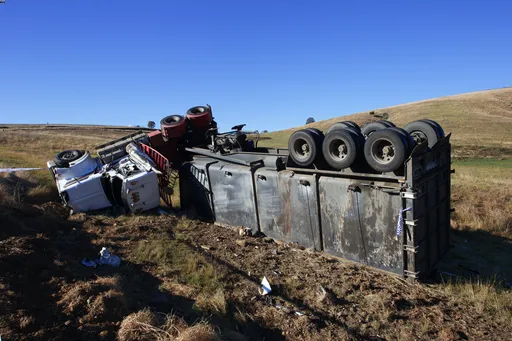While safely maneuvering a large commercial truck can be difficult, this is not an excuse for truck drivers to put other people in harm’s way. This applies when truck...
Read more
How Does Sleep Deprivation Affect Truckers and Cause Accidents?
We have all seen the unexpected, late-night traffic jams due to an overturned truck on the highway.
Our fast-paced economy depends on moving goods from one place to another, and that means trucks have to move as fast as possible down the highway—sometimes without regard to basic safety precautions.
Sadly, trucking accidents are not uncommon. Many factors play a role in these accidents, but driver fatigue is a key reason for truck crashes.
One industry insider estimates that around 70% of all trucking accidents are caused by driver fatigue.
If you or a loved one have been injured by sleep-deprived truckers on the road, the D’Amore Law Group can help.
Here, we will explain the dangers of drowsy driving. We will also discuss how to identify a drowsy driver and ways to avoid an accident.
Finally, we will provide a perspective on what to do after a sleep deprivation trucking accident.
Truck Accidents Due to Sleep Deprivation
A national survey reveals that more than 328,000 drowsy driving crashes occur each year, resulting in about 800 fatalities and 50,000 injuries. And the real number of drowsy driving crashes may be much higher as it is difficult to determine if a driver was fatigued at the time of the crash.
Alarmingly, commercial truckers are among those more likely to drive drowsy. Many experts believe that driving while tired is similar to driving under the influence.
As a result, the U.S. Department of Transportation and other regulatory agencies have tightened their regulations on long-haul trucking due to concerns about sleep deprivation and long-haul truckers.
Commercial and professional truck drivers drive on the roads for up to 11 hours per day. Truck driver anti-fatigue rules limit the number of hours that a truck driver can drive before a mandatory break.
That break must last for a specific amount of time. Even with these rules in place, truckers can still drive up to 60 hours in seven days. And even with mandatory breaks, driving for extended periods inevitably leads to road blindness, dulled senses, and fatigue.
The risk of dulled senses and fatigue increases at nighttime, when the body attempts to maintain its natural sleep cycle.Driving in this dulled and drowsy state is reckless, and is often mandated by trucking companies in order to maintain schedules.
However, drowsy driving puts everyone on the road in danger and potentially causes more delays than it prevents. If you believe that you have been injured by a sleep-deprived trucker, contact D’Amore Law Group today.
Speaking with an experienced attorney soon after a major accident can help give you the peace of mind that you deserve. An attorney can also help protect your rights.
What Is Drowsy Driving?
A driver under the influence of sleep deprivation often looks a lot like a driver under the influence of drugs or alcohol.
According to the Centers for Disease Control and Prevention, lack of sleep can have the same effect on driving as having a blood alcohol content (BAC) of 0.05 percent.
Extreme lack of sleep can have the effect of a BAC of 0.10 percent—more than the legal limit in most U.S. states. With judgment and coordination impaired, accidents are inevitable.That said, there are some drowsy driving warning signs to look out for.
Some of the warning signs of a drowsy driver may include:
- Drifting in and out of their lane,
- Making sudden cutting motions or overcorrections across traffic,
- Hitting roadside rumble strips or the median, and
- Failing to timely “stop” or “go” at a signal.
Drivers who exhibit these behaviors may be intoxicated or exhausted. If a driver is exceptionally reckless, get yourself to safety and notify law enforcement.
Signs of Sleep Deprivation
Signs of sleep deprivation in truckers are not always obvious until it is too late. Often, truckers do not have regular driving schedules.
As a result of long driving days and inconsistent work schedules, it may be difficult to achieve a consistent sleep pattern.
Due to the prevalence of sleep disorders—like insomnia or sleep apnea—among truckers, some drivers may be tempted to use sleep aids to fall asleep.
In other instances, drivers use stimulants to counteract the lingering effects of sleep aids or long-lasting fatigue. However, even over-the-counter substances can impair response time, judgment, and reflexes.
If you are injured in a trucking accident and observe sleep aids or stimulants at the scene of the accident, let your attorney know as soon as possible. These indicators of sleep deprivation are important for your lawyer to note.
Liability For a Trucking Accident
When thinking about liability, it is important to ask, “How does sleep deprivation affect truckers and accidents?”
For instance, if a trucker chooses not to take their break, does that mean that the trucking company is no longer liable if the trucker is too fatigued to drive and then gets into an accident? The answer is complex.
When you are injured by a sleep-deprived trucker, there may be many people responsible for your injuries and damages.
These parties may include:
- The truck driver,
- The trucking company or truck owner/lessor,
- The vehicle manufacturer, and
- The cargo company.
The driver and their employer have a duty of care when the driver is out on the road. For the most part, drivers and trucking companies are responsible and well-trained.
However, when companies do not take responsibility for their drowsy drivers, an experienced trucking accident attorney can help you navigate a personal injury lawsuit.
How the D’Amore Law Group Can Help
At D’Amore Law Group, we are experienced truck accident lawyers with a track record of success.
Before signing any papers presented to you by insurance companies, seek advice from experienced legal counsel.
D’Amore Law Group team will examine your case to ensure you pursue all available avenues of recovery. Meet one of our truck accident attorneys for a free consultation in one of our offices.
